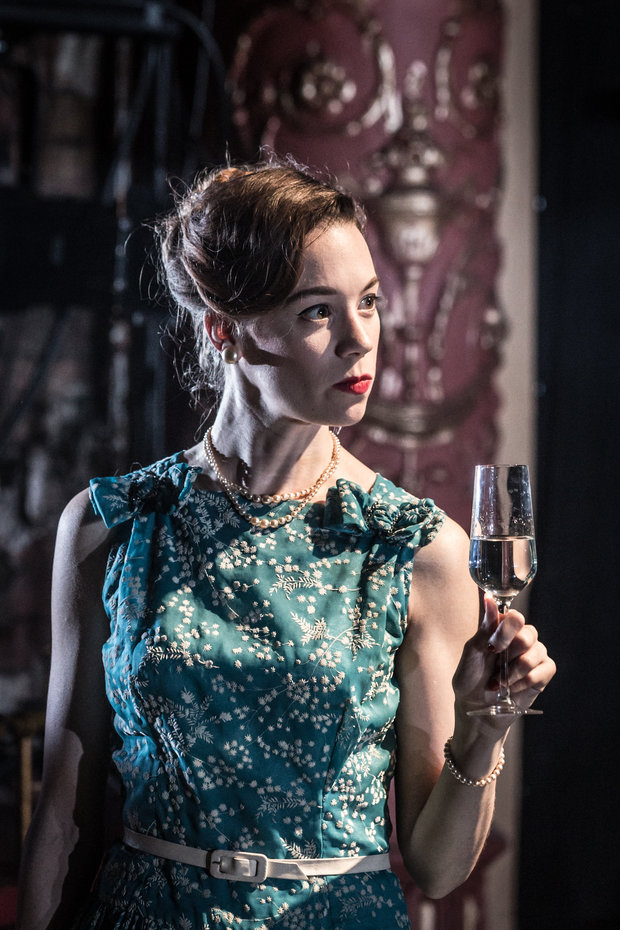It’s a pleasing serendipity that while Martin McDonagh’s clamorously anticipated Hangmen opened at the Royal Court last night, just a little further west T.S Eliot’s The Cocktail Party should also be having its opening night. Back in 1956 another Royal Court premiere – John Osborne’s Look Back In Anger – called time on Eliot and his dramatic ilk, ushering him into a neglect from which he has never really recovered. But now, sitting once again alongside a younger, more daring breed of theatre, Eliot’s drama proves that – given a chance – it can hold its own.
Prescribed by its author as a comedy (and swallowed greedily as such by the crowds that sustained the play’s initial Broadway run for over 400 performances, winning Eliot a Tony along the way), The Cocktail Party is actually quite the bitter theatrical pill. Drawing-room comedy collides with Greek tragedy to create a sort of secular passion play, a meditation on martyrdom and sainthood where Gin rather than God is source of all succour, and crudités come before crucifixions.
The brilliant Warren leads the comic charge
There’s also the small matter of the text; the play is a verse drama – bound (thankfully) by looser constraints than Murder in the Cathedral, but poetry nonetheless. If you didn’t know it, however, there’s nothing in the fluid, pacy delivery of Abbey Wright’s cast in this taut new Print Room production that would give it away, save perhaps a peculiarly Shakespearean sense of spoken poise. A single verse form must accommodate everything tonally from Coward to Pinter, and it’s the actors who must smooth the transitions, anchoring the early comedy sufficiently to keep the play’s suddenly serious ending from tripping over its own portentousness. It’s a long game that Wright balances beautifully here.
The Print Room’s new home in Notting Hill’s Coronet Cinema gives it much more space, as this first production in the newly adapted main auditorium makes clear. Occupying it to the full, Wright’s actors give their domestic doings a scope and stature, hinting – along with Gary Yershon’s sound design and Wright’s stylised scene-changes – at something beyond the chatter. That something takes gently disquieting form in Hilton McRae’s Unidentified Guest. Lean and sparing of gesture, McRae’s psychologist-cum-priest is torn between boyish delight in his power games – eyes bright with scheming – and a cultivated stillness and focus. There’s no attempt to fill the void Eliot leaves in his motivation, but the dramatic energy shift of his brief ritual encounter with Marcia Warren’s Julia and Christopher Ravenscroft’s Alex speaks loudly of its conviction.
 The brilliant Warren leads the comic charge, delivering social sniper fire with relaxed accuracy, deftly assisted by Ravenscroft. Their light-touch brittleness rebounds off Richard Dempsey’s Edward. His energy is an impassive charge of absorption, stillness, thrust into relief only by the arrival of Helen Bradbury’s assertive Lavinia – physically dominant, but cultivating a beautiful delicacy in the final scene.
The brilliant Warren leads the comic charge, delivering social sniper fire with relaxed accuracy, deftly assisted by Ravenscroft. Their light-touch brittleness rebounds off Richard Dempsey’s Edward. His energy is an impassive charge of absorption, stillness, thrust into relief only by the arrival of Helen Bradbury’s assertive Lavinia – physically dominant, but cultivating a beautiful delicacy in the final scene.
At the pierced heart of it all is Chloe Pirrie’s Celia (pictured right) – the mistress and drawing-room martyr sent to her unexpected death. Swallowing Eliot’s pompous, self-denying creed is tough, but Pirrie makes it harder by never quite finding in Celia that sweetness and joyous innocence that is needed to balance the dramatic scales. As it is, Christian philosophy threatens to overwhelm emotion, saved only by the dignity of her “consultation” scene with McRae.
Critic Kenneth Tynan famously claimed that while Eliot could “lower the dramatic temperature” he was incapable of raising it. It’s an assertion given the lie by Wright and her cast who find deep moral discomfort as well as gilded drawing-room gloss in The Cocktail Party. Feeling here is the equal of thinking – a balance Eliot might not have approved of, but which makes newly palatable sense of an unfashionably difficult play.
- The Cocktail Party is at The Print Room until 10 October















Add comment